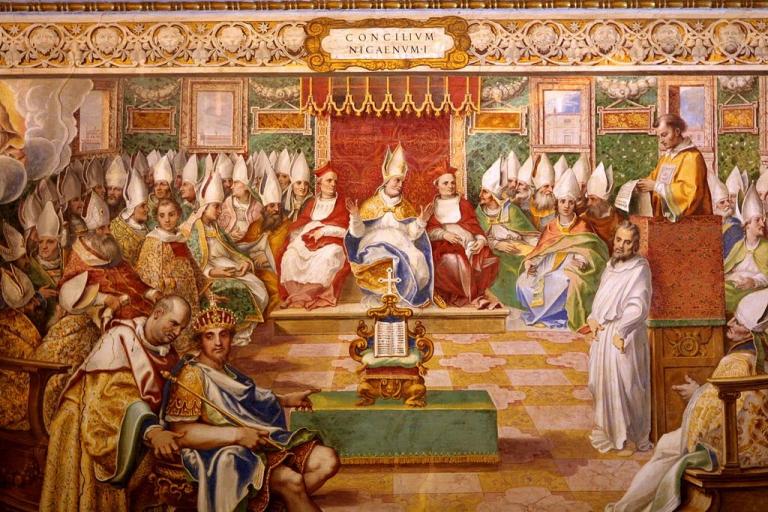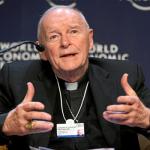
Our Pastor (and son-in-law), Rev. Ned Moerbe, preached a sermon that taught me some things I never realized about the Nicene Creed. In particular, how the Creed sets forth the two natures of Christ and discloses their significance.
First, consider the Second Article of the Creed, divided into its three points, as the sermon describes:
And in one Lord Jesus Christ, the only begotten Son of God, begotten of his Father before all words, God of God, Light of Light, very God of very God, begotten, not made, being of one substance with the Father, by whom all things were made; [the divinity of Christ]
who for us men and for our salvation came down from heaven and was incarnate by the Holy Spirit of the virgin Mary and was made man; [the humanity of Christ]
and was crucified also for us under Pontius Pilate. He suffered and was buried. And the third day he rose again according to the Scriptures and ascended into heaven and sits at the right hand of the Father. And he will come again with glory to judge both the living and the dead, whose kingdom will have no end. [the work of Christ]
Now read the discussion of the Nicene Creed in the sermon:
When the saints who have gone before us were faced with doctrinal challenges, they studied the Word of God in order to confess rightly what God has revealed to us in His Word. There are twin forces at work in the history of the Church to shape our creeds and confessions. On the one hand you have the revelation of Scriptures giving us the substance from which the creeds were formulated, and on the other hand you have the conflicts that forced our fathers in the faith to shape their confession.
One may think of it as the Scripture being the raw material, the marble, that is shaped into a concise confession by the chisel of controversy. For instance, when Arius taught that Son was a creation of the Father such that he could be called a god, but not true God, the faithful responded by making sure that the Nicene Creed confessed Jesus to be “very God of very God, begotten, not made,” and “of one substance with the Father.” But what are we do make of all the things that did not make it into the Creed.?
Have you ever noticed that the Nicene and Apostle’s Creeds make no reference to any of what we typically refer to as miracle stories? We don’t confess that Jesus cast out demons every time we confess the creeds, even though with this faith demons are routinely cast out, including in our baptismal rite. And certainly in the history of the Church these things also have been contested. Why some and not others?
The Nicene creed which we have just confessed can be divided to include three articles, each corresponding to a Person of the Trinity, and the second article itself can be broken into three distinct points: The divinity of Christ, the humanity of Christ, and the work of Christ. But the works of Christ that are included in the Creed are all things that Jesus does according to His humanity. That is to say, it is as a man that Jesus does these things. And that is important to remember. That is not to say that He does these things apart from His divinity, but it is important to note that it is a man who does these things.
The active verbs of the second article relating to the incarnate works of Christ begin with the incarnation itself. Our Lord Jesus Christ came down from heaven. That is the turning point not only of the Creed but of history. There is a reason that for centuries the church acknowledged the importance of the mystery of the incarnation by bowing whenever she confessed that Jesus was made man. It is only because the Son of God assumed our human nature that He suffered under Pontius Pilate and was buried and rose again. Without a human nature, there would be no death, no resurrection, no ascension. Without a human nature, it would not be our brother who was to come again and judge the living and the dead.
So again I ask, why some and not others? Why do we confess these actions of our incarnate Lord and not others? Why do we not confess that Jesus cast out demons, taught with authority, turned water into wine, and foretold events yet to come? I would suggest to you that the ancient fathers omitted those things because though Jesus did them while in the flesh, they did not require His flesh. God had done those things in the past through the prophets and He would continue to do them through the apostles and His Church.
[Keep reading. . .]
Illustration: Council of Nicaea, Fresco in Capella Sistina (1590), Vatican [Public domain], via Wikimedia Commons














